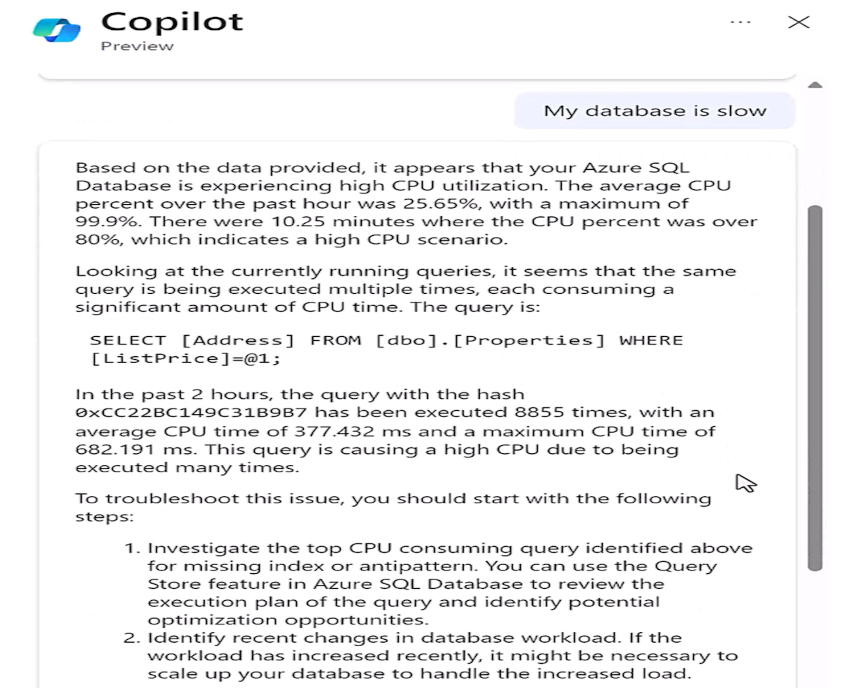
Introduction
In the fast-evolving landscape of database management, efficiency, accuracy, and innovation are key drivers of success. Copilot, an AI-powered code completion tool, has gathered attention for its ability to assist developers in writing code faster and with fewer errors. But beyond general coding tasks, Copilot offers significant benefits for database management, making it an indispensable tool for database administrators and developers alike. This blog explores how Copilot can revolutionize the way we interact with databases, streamline workflows, and improve data integrity.
Introduction to Copilot

Microsoft Copilot is an AI-powered code completion tool that utilizes the large language model to assist developers in writing code. It provides real-time code suggestions, auto-completes entire lines or blocks of code, and offers contextual suggestions based on the code being written. This powerful tool is also integrated into popular code editors like Visual Studio Code through extensions which makes it accessible to a wide range of developers.
Role of copilot in databases
Copilot's role in databases is to help users write SQL queries and troubleshoot database issues using natural language prompts. Copilot is a preview set of experiences powered by large language models (LLMs) that can understand context and provide helpful, context-rich suggestions. With Copilot, we can ask questions or provide prompts in natural language, and it will generate relevant SQL queries or provide insights to help us resolve database issues. Some examples are:
- If we are experiencing slow performance, we can ask Copilot "My database is slow," and it will analyze our database and provide specific areas that might be contributing to the issue.
-
Copilot can also help us tune queries, optimize database performance, and provide answers to questions about our database and SQL queries. We can ask prompts like "How much space is being used by this database?" and Copilot will provide the relevant information.
-
Microsoft Copilot in Azure is now integrated with Azure SQL Database, enhancing the management and operation of SQL-dependent applications. It improves productivity in the Azure portal by offering natural language to SQL conversion and self-help for database administration.
-
Copilot provides relevant answers to user questions, simplifying database management by utilizing database context, documentation, dynamic management views, Query Store, and other knowledge sources.
-
Database administrators can independently manage databases and resolve issues or learn more about the performance and capabilities of your database.
-
Developers can ask questions about their data as they would in text or conversation to generate a T-SQL query. Developers can also learn to write queries faster through detailed explanations of the generated query.
To answer some questions about Azure SQL Database, Microsoft Copilot may need to connect to database in the context of current Azure portal login context and execute queries on dynamic management views and query store system tables. The following considerations and limitations apply when connecting to Azure SQL Database:
- Allowlist your IP (Intellectual Property) on your server: To be able to successfully extract necessary information, we need to add your outbound IP address to the server's allowed firewall rules to access your databases.
- Open TCP ports 433 and 1433: We might get persistent errors while executing prompts that try to get information from our database if we have not enabled outbound port TCP 1433 and 433.
- Permissions on your database: Since Copilot operates on behalf of the current user context, if we do not have permissions to execute some DMV queries on our database, Copilot will fail to correctly answer your question.

Sample prompts for Microsoft copilot
Practical Applications of Copilot in Database Management

Application of Copilot
1. Writing SQL Queries:
Copilot excels at assisting with SQL query writing. Whether it is a simple SELECT statement or a complex JOIN operation, Copilot provides accurate and context-aware suggestions. For instance, if a developer starts typing a query to retrieve customer data, Copilot can suggest the appropriate table names, column names, and conditions, streamlining the query-writing process.
Example: SQL
Copy code
-- Initial query
SELECT * FROM customers WHERE
-- Copilot suggestion
SELECT * FROM customers WHERE customers = 1;
2. Database Schema Design:
Designing and maintaining database schemas can be a time-consuming task. Copilot simplifies this by offering suggestions for creating tables, defining relationships, and setting constraints. This ensures that the schema adheres to best practices and is optimized for performance.
Example:
SQL
Copy code
-- Initial schema creation
CREATE TABLE users (
-- Copilot suggestion
CREATE TABLE users (
user_id INT PRIMARY KEY,
username VARCHAR (50) NOT NULL,
email VARCHAR (100) NOT NULL UNIQUE,
created_at TIMESTAMP DEFAULT CURRENT_TIMESTAMP
);
3. Data Migration and Transformation:
Data migration often involves transforming data from one format to another. Copilot can assist in writing scripts that handle data migration efficiently. By suggesting code snippets for data extraction, transformation, and loading (ETL) processes, Copilot ensures that migrations are smooth and error-free.
Example: SQL
Copy code
-- Initial ETL script
INSERT INTO new_table (id, name)
-- Copilot suggestion
INSERT INTO new_table (id, name)
SELECT old_id, old_name FROM old_table;
Advanced Features and Customization

Snapshot for the query database is slow
-
Custom Code Snippets: Copilot allows users to create custom code snippets that can be reused across different projects. This is particularly useful for database administrators who frequently perform repetitive tasks. By saving these snippets, DBAs can quickly insert them into their scripts, saving time and ensuring consistency.
-
Integration with Database Tools: Copilot seamlessly integrates with popular database management tools like MySQL Workbench, PgAdmin, and SQL Server Management Studio. This integration ensures that DBAs can utilize Copilot's capabilities within their preferred working environment, enhancing their productivity without requiring them to switch tools.
-
Real-time Collaboration: For teams working on database projects, Copilot supports real-time collaboration. Developers can share their code and suggestions with team members, facilitating knowledge sharing and ensuring that best practices are followed. This collaborative approach leads to more robust and maintainable database solutions.
 Custom code snippet suggested by copilot
Custom code snippet suggested by copilot
Future of Copilot in Database Management
The future of Copilot in database management looks promising. As AI (ARTIFICIAL INTELLIGENCE) technology continues to evolve, we can expect Copilot to become even more sophisticated, offering deeper insights and more advanced suggestions. Features such as automated performance optimization, intelligent indexing, and predictive analytics could become integral parts of Copilot's capabilities, further revolutionizing database management.
Conclusion
Copilot is a notable change for database management, offering numerous benefits that enhance productivity, reduce errors, and accelerate learning. By utilizing its capabilities, DBAs and developers can streamline their workflows, improve data integrity, and stay ahead in the competitive landscape of data management. As AI technology continues to advance, Copilot is poised to become an indispensable tool in the arsenal of every database professional. Together we can explore the potential of Copilot and can unlock new levels of productivity and innovation in your work.
-
Get an Insight into Test Data Management Process and Tools
-
Learn more about Data Lineage, Best Practices and Techniques



